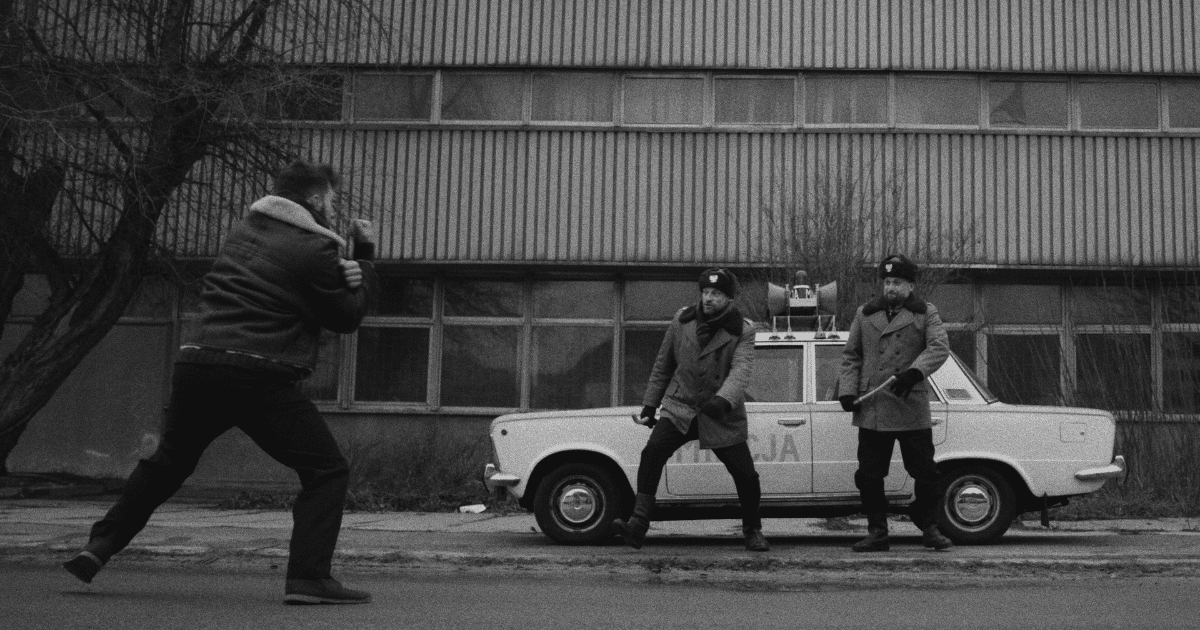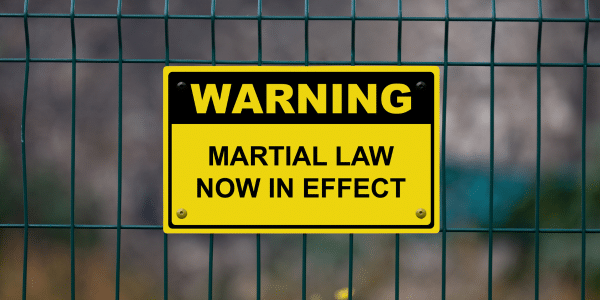Martial Law & Democracy: Balancing Act or Constitutional Clash?
Unless you’ve been under a rock, there has been talk of martial law over the years with everything going on in the US and around the world. That said, not many people understand what it really is.
In the shadow of crises and emergencies, the notion of martial law emerges as a double-edged sword, poised between the imperative to protect a nation and the unsettling prospect of sacrificing individual liberties in the name of security. Personally, I’m not a fan of the thought of it being enforced.
The very concept challenges the core principles of democracy and personal freedom, prompting a critical examination of its legality and the potential encroachments on our rights.
As we navigate through the murky waters of uncertainty, the looming question persists: can the suspension of certain civil liberties truly be justified as a means to safeguard the collective well-being, or does it mark a perilous departure from the very foundations upon which our societies stand?

In this article, we will dive deeper into martial law and get a better understanding of why you may have a major issue with it. Is it really there to protect us?
Table of contents
- What is Martial Law?
- What Happens If We Declare Martial Law?
- Why Would Martial Law Be Declared and Who Declares It?
- What Power Does the President Have During Marital Law?
- How Long Can Martial Law Last?
- Can They Confiscate My Preps and Firearms During Martial Law?
- How Can I Prepare for Martial Law?
- What Happens If I Do Not Comply?
- To Hell with Your Freedoms and Liberties?
- FAQs
What is Martial Law?
Martial law is a legal and temporary imposition of military rule by a government, typically in response to a crisis or emergency situation. During martial law, civil liberties and normal constitutional rights may be suspended or restricted, and the military takes on a more prominent role in maintaining law and order. This can involve the deployment of military forces to enforce order, the imposition of curfews, censorship of the media, and the suspension of certain legal processes.
Governments often declare martial law when faced with threats such as internal unrest, natural disasters, or widespread violence that cannot be effectively addressed through regular law enforcement channels. Martial law is generally considered an exceptional measure, as it involves a significant departure from normal governance and the rule of law.
It’s important to note that the declaration of martial law raises concerns about potential abuses of power and violations of human rights. As such, its implementation is typically subject to legal and constitutional limitations to prevent its misuse. The decision to declare martial law is a serious one and is ideally made with the aim of restoring order and ensuring the safety and well-being of the population.
What Happens If We Declare Martial Law?
The declaration of martial law in the United States would represent a significant departure from normal governance and would have far-reaching implications. It’s important to note that when martial law has been declared, it is typically implemented in response to a serious crisis or emergency situation, and the specific effects can vary depending on the circumstances and the decisions made by authorities.
Here are some general aspects of what might happen if the US were to go into martial law:
1. Increased Military Presence: Martial law declaration involves the deployment of military forces to maintain law and order. This could mean soldiers patrolling the streets, manning checkpoints, and taking on roles typically performed by civilian law enforcement.
2. Suspension of Civil Liberties: In a martial law scenario, certain civil liberties and constitutional rights may be temporarily suspended or restricted. This could include limitations on freedom of speech, assembly, and movement.
3. Curfews and Restrictions: During the use of martial law, authorities may impose curfews to restrict movement during specific hours. There could also be restrictions on travel within certain areas, depending on the perceived threat.
4. Censorship: When in a state of martial law, the government may exercise control over media outlets to prevent the spread of information deemed harmful to public order. This could involve censorship or restrictions on certain types of communication.
5. Legal Processes: The normal legal processes may be altered or suspended during martial law. Civilian courts might be replaced or supplemented by military tribunals, and habeas corpus (the right to a fair trial) could be affected.
6. Economic Impact: Martial law can have economic consequences, including disruptions to businesses, transportation, and other essential services. The uncertainty associated with martial law can also impact financial markets.
7. Civilian Involvement: Depending on the situation, civilians may be required to cooperate with authorities, and failure to comply could result in legal consequences.

Why Would Martial Law Be Declared and Who Declares It?
Martial law is typically declared in response to a serious crisis or emergency situation that poses a significant threat to public order, safety, or the functioning of the government. Common reasons for declaring martial law include:
1. Internal Unrest: Widespread civil unrest, riots, an insurrection, or other forms of domestic violence that cannot be adequately addressed by regular law enforcement measures may lead to the national or state declaration of martial law.
2. Natural Disasters: In the aftermath of a severe natural disaster, such as a hurricane, earthquake, or widespread flooding, martial law may be declared to coordinate and enforce emergency response efforts. If any state is to declare a state of emergency, they can enforce martial law in times of natural disasters.
3. Terrorist Threats: A credible and imminent terrorist threat or attack may prompt authorities to declare martial law to ensure the safety of the population and prevent further acts of terrorism.
4. Pandemics: During a severe public health crisis, such as a widespread and uncontrollable disease outbreak, martial law may be considered to enforce quarantine measures and ensure public health and safety.
5. War or Foreign Invasion: Martial law can be declared if war has been declared or foreign invasion when the regular functioning of civilian institutions is compromised and military control is deemed necessary for national defense.
The authority to declare martial law typically rests with the highest-ranking government officials, such as the head of state (in the US, it would be the president to declare martial law), the head of government (prime minister), or another designated authority.
Related Article: Are You Concerned About Losing Freedoms Here in America?
In the United States, for example, the power to declare martial law is not explicitly mentioned in the Constitution. Instead, the Constitution gives Congress the power to suspend habeas corpus in times of rebellion or invasion. The President can also use emergency powers, but the extent of these powers is a subject of legal and constitutional debate.
What Power Does the President Have During Marital Law?
The powers of the President during martial law in the United States can vary, and the specific authority granted to the President in such situations is a complex and debated issue.
The US Constitution does not explicitly mention martial law, and the power to declare martial law is not explicitly granted to the President. However, the President may have certain powers and responsibilities during emergencies or times of crisis, and these can be used to address the situation.

Here are some general aspects of the President’s powers during martial law or a state of emergency once there is a presidential declaration of martial law:
1. Commander-in-Chief Powers: The President shall be Commander in Chief of the Armed Forces, and the President has the authority to deploy military forces to address a crisis during the implementation of martial law. This could involve using the military to maintain law and order, respond to a natural disaster, or address a domestic security threat.
2. Emergency Powers: The President may invoke emergency powers granted by specific laws or statutes. The National Emergencies Act of 1976, for example, allows the President to declare a national emergency, triggering special powers and authorities.
3. Use of the National Guard: The President can deploy the National Guard, which operates under both state and federal authority to enforce the law. Governors of states have control over their respective National Guard units during normal circumstances, but the President can federalize them for broader use in emergencies.
4. Executive Orders: The President can issue executive orders to direct federal agencies and officials in responding to a crisis. These orders can cover a range of issues, including the deployment of resources, coordination of government agencies, and the implementation of specific policies.
5. Control over Communication and Media: In times of martial law or emergency, the President may have authority over communication channels to ensure the dissemination of accurate information and to prevent the spread of misinformation that could exacerbate the crisis.

It’s important to note that any exercise of emergency powers by the President is subject to legal and constitutional constraints. The Constitution divides powers among the branches of government, and the use of emergency powers is typically subject to checks and balances. Additionally, the duration of these powers is often limited, and they are expected to be used only to address the specific emergency at hand.
The specifics of the President’s powers during martial law can be influenced by legal interpretations, specific statutes, and the overall constitutional framework. The use of such powers is a delicate matter, and there is often scrutiny and oversight to prevent abuses and ensure that they are used responsibly and in accordance with the rule of law.
How Long Can Martial Law Last?
The duration of martial law is not explicitly defined or limited by law in the United States, and it largely depends on the circumstances and the decisions made by the authorities overseeing the situation. Martial law is generally considered a temporary and exceptional measure, implemented in response to a crisis or emergency that threatens public order, safety, or the functioning of the government.
Related Article: How to Get Prepared and Be Safe as an Urban Survivalist
The US Constitution does not explicitly provide for martial law, but it does include provisions that may be relevant in emergency situations. For example, Article I, Section 9, Clause 2 of the Constitution states that the writ of habeas corpus (the right to a fair trial) may be suspended in cases of rebellion or invasion when the public safety may require it. Additionally, the Constitution divides powers among the branches of government, and any exercise of emergency powers by the President is subject to checks and balances.
In practice, the duration of martial law is expected to be limited to the time necessary to address the specific crisis or emergency at hand. Once the situation is deemed under control, the normal rule of law and governance are typically restored. Prolonged or indefinite martial law raises significant legal and constitutional concerns, as it may infringe on civil liberties and the principles of democratic governance.

Governments are generally expected to justify the imposition of martial law, and its continuation should be regularly assessed based on the evolving circumstances. In many cases, legislatures or other oversight bodies play a role in reviewing and approving the declaration or extension of martial law.
Can They Confiscate My Preps and Firearms During Martial Law?
In a situation of martial law, the government may have increased powers to maintain order and respond to emergencies. The extent to which your personal property, including preps (preparations for emergencies, such as food, water, and supplies) and firearms, could be affected would depend on the specific circumstances and the laws in place.
Here are some general considerations:
1. Firearms
The Second Amendment of the US Constitution protects the right of individuals to keep and bear arms. However, even under martial law or emergencies, there may be restrictions on the possession and use of firearms to ensure public safety. Laws governing the use and possession of firearms can vary by jurisdiction, and emergency measures might involve additional regulations. It’s important to be aware of and comply with local laws regarding firearms. Also, under martial law, they can come confiscate firearms. See where this can be a real issue? They’re disarming you and not allowing you to protect yourself.
2. Property Confiscation
Governments generally have the authority to seize property in certain situations, especially during emergencies. This power is often subject to legal and constitutional limitations. The circumstances under which property can be seized, the types of property subject to confiscation, and the process for such actions can vary. Confiscation of property, including preps, would ideally be based on a legitimate public interest and be subject to legal safeguards. But let’s be real: when the time comes, they will come for your preps, and won’t need a reason to take them. Kiss all of your stored food and water goodbye.

It’s crucial to note that any government action, including property confiscation, during martial law should ideally be subject to legal review and oversight. Legal protections and due process rights are fundamental principles even during extraordinary circumstances. The specific laws and regulations in place during martial law would dictate the extent of government powers and the protections afforded to individuals.
How Can I Prepare for Martial Law?
Preparing for martial law involves a combination of general emergency preparedness and understanding the specific challenges and dynamics associated with a declaration of martial law. The declaration of martial law and the state of martial law may change a lot of things in our lives. Here are some general guidelines to help you prepare:
- Stay Informed:
- Stay abreast of current events and developments that might indicate a potential for martial law.
- Monitor official sources of information and government announcements.
- Emergency Supplies:
- Maintain a basic emergency supply kit that includes essential items such as food, water, first aid supplies, medications, and other necessities.
- Consider having a longer-term supply of essentials in case of extended disruptions.
- Communication Plan:
- Establish a communication plan with family and loved ones. Ensure everyone knows how to get in touch and where to meet in case of separation.
- Keep emergency contact information readily available.
- Legal Documents:
- Keep important documents such as identification, insurance papers, and legal documents in a secure and easily accessible location.
- Make copies of important documents and store them in a separate location.
- Know Your Rights:
- Understand your rights and responsibilities under normal circumstances, as well as any changes that may occur during martial law.
- Stay informed about relevant laws and regulations.
- Community Engagement:
- Be involved in your community and stay connected with neighbors. A strong community can provide support and assistance during challenging times.
- Financial Preparedness:
- Keep some cash on hand in case of disruptions to banking and electronic payment systems.
- Consider having a financial reserve to cover expenses during extended periods of uncertainty.
- Follow Authorities’ Instructions:
- Stay informed about official instructions and comply with any directives from law enforcement and government authorities.
- Monitor local news and official government channels for updates and guidance.
- Security Measures:
- Ensure the security of your home and property. Follow any guidelines or restrictions related to firearms if applicable.
- Be cautious about sharing sensitive information, especially on social media.
- Legal Advice:
- Consult with legal professionals to understand your rights and responsibilities in the context of martial law.
- Seek legal guidance if you believe your rights are being violated.
What Happens If I Do Not Comply?
If martial law is declared and you do not comply with orders or directives issued by authorities, the consequences can vary depending on the nature of your non-compliance and the specific laws and regulations in place.
Personally, I will not comply (but that’s just me). I don’t trust the government.

It’s important to note that during times of martial law, governments may have broader powers to enforce order and public safety, and failure to comply with directives may result in legal consequences.
Here are some potential outcomes if you do not comply during martial law:
1. Legal Consequences
- Authorities may take legal action against individuals who refuse to comply with lawful orders. This can include arrest, fines, or other penalties.
2. Detention or Imprisonment
- Non-compliance with martial law orders could lead to detention or imprisonment, especially if authorities deem your actions a threat to public safety or order.
3. Use of Force
- Authorities may use force, including non-lethal methods, to compel compliance. In extreme cases, lethal force may be employed if there is a perceived threat to public safety.
4. Confiscation of Property
- Non-compliance may result in the confiscation of property, especially if it is deemed necessary for maintaining order or responding to the emergency.
5. Loss of Rights
- Depending on the circumstances, non-compliance could lead to the suspension or restriction of certain rights and freedoms. This might include restrictions on freedom of movement, assembly, or speech.
To Hell with Your Freedoms and Liberties?
In considering the imposition of martial law as a means to protect the country and its people, a fundamental question emerges regarding the delicate balance between security and individual liberties.
While the intention behind martial law is often to restore order and respond to emergencies, the potential for the erosion of civil rights raises significant concerns. The legality of such measures, particularly when they involve the suspension of constitutional rights, must be rigorously scrutinized to ensure that the extraordinary powers granted to authorities are both necessary and proportionate.

As societies grapple with the challenges of maintaining public safety in times of crisis, the ongoing debate over the legality and ethical implications of martial law underscores the importance of safeguarding the principles of justice, democracy, and individual freedoms, even in the face of pressing threats.
So, now what are your thoughts on martial law? Is it for the good of the people in the face of the emergency or a way to crush your freedoms and liberties? I think powers under martial law must be analyzed, as well as the ability to declare martial law. I can’t, in good faith, tell you that powers won’t be abused when under martial rule. If they impose martial law, I feel as if all bets are off, and everyone is essentially on their own. Current law and the limits of martial law will be thrown out the window.
FAQs
Martial law is the temporary imposition of military rule during emergencies or crises, such as widespread civil unrest, natural disasters, or security threats. It involves the suspension or restriction of certain civil liberties and the increased involvement of the military in maintaining law and order.
Martial law can temporarily suspend or restrict constitutional rights, including freedom of speech, assembly, and movement. It may also involve increased military presence, curfews, and limitations on civilian activities.
The authority to declare martial law typically rests with the highest-ranking government officials, such as the head of state or government. The President may use emergency powers in the United States, but the specifics are subject to legal and constitutional constraints.
The government may have increased powers during martial law, including the ability to seize property. However, the specifics depend on the circumstances and the laws in place. It’s important to be aware of and comply with local laws regarding firearms.
The duration of martial law is not explicitly defined and can vary based on the specific crisis. It is generally considered a temporary and exceptional measure, with its continuation subject to ongoing assessments of the situation.
Non-compliance may lead to legal consequences, including arrest, fines, or other penalties. Authorities may use force, and property confiscation could occur. Staying informed about directives and seeking legal advice if concerns arise is essential.
The compatibility of martial law with democratic principles is a subject of debate. While it is acknowledged as a temporary and exceptional measure, the potential for abuse and the infringement on civil liberties raise significant concerns that require careful consideration.
Preparedness involves staying informed, maintaining emergency supplies, having a communication plan, understanding legal rights, engaging with the community, and being aware of financial considerations. Following authorities’ instructions is crucial for personal safety.
Yes, individuals can challenge martial law legally if they believe their rights are being violated. Seeking legal counsel and understanding the constitutionality of directives are important steps in ensuring that the exercise of emergency powers remains within legal bounds.
The long-term implications depend on how martial law is implemented and the commitment to restoring normal governance once the crisis has passed. Vigilance in protecting civil liberties is essential to prevent undue encroachments on individual freedoms.


*Disclosure: This article may contain affiliate links or ads, which means we earn a small commission at no extra cost to you if you make a purchase through these links. These commissions help support the operation and maintenance of our website, allowing us to continue producing free valuable content. Your support is genuinely appreciated, whether you choose to use our links or not. Thank you for being a part of our community and enjoying our content.
PLEASE CONSIDER SHARING THIS ON YOUR SOCIAL MEDIA TO HELP OTHERS LEARN MORE ABOUT THIS TOPIC. SIMPLY CLICK BELOW!

